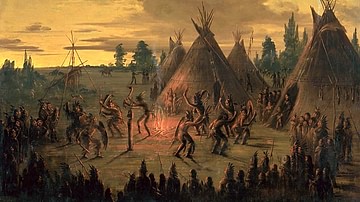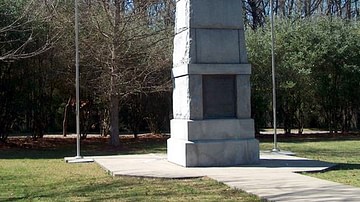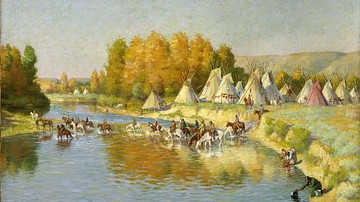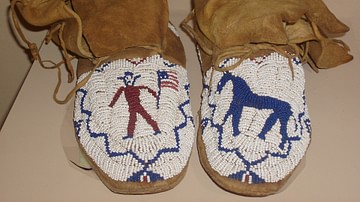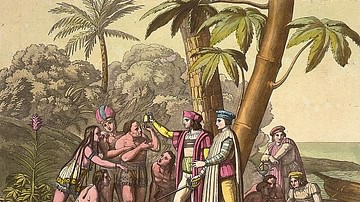Ûñtsaiyĭ', the Gambler is a legend of the Cherokee nation, known as a Wonder Story, which features supernatural characters, sometimes interacting with mortals, sometimes with each other. In Ûñtsaiyĭ', the Gambler, all the characters are supernatural entities representing natural phenomena such as thunder and lightning.
The story features the common Native American motif of the young boy's journey from youth to maturity and the challenges he must overcome. Unlike other wonder stories – including The Man Who Married the Thunder's Sister – there are no mortals in Ûñtsaiyĭ', the Gambler and the action of the piece follows one of the sons of Thunder on his quest for healing and, ultimately, wholeness.
At the center of the tale is Ûñtsaiyĭ', the gambler, a trickster figure similar to those in the legends of other Native peoples of North America, including the Wihio tales of the Cheyenne, Iktomi tales of the Sioux, and the Nih'a'ca tales of the Arapaho, among many others. In this story, the trickster Ûñtsaiyĭ' serves to convey the cultural value of honoring one's promise in agreements and paying what one owes, no matter how great the price.
Ûñtsaiyĭ' (also known as E'tsaiyi or Tsaihi) exemplifies the character of the gambler who lives by his wits but finds his luck run out when he bets against the son of the Thunder. The game they play may be stickball (known as Anetso to the Eastern Cherokee nation) or could be chunkey, the game which, according to Cherokee lore, Ûñtsaiyĭ' invented.
As with all the works of Native American literature, there are multiple levels of meaning to Ûñtsaiyĭ', the Gambler and many possible interpretations. The story was popular among the Cherokee in the past and continues to be shared in their communities in the present day.
Text
The following is taken from Myths of the Cherokee (1900) by James Mooney, republished by Dover Publications, 2014.
Thunder lives in the west, or a little to the south of west, near the place where the sun goes down behind the water. In the old times he sometimes made a journey to the east, and once after he had come back from one of these journeys a child was born in the east who, the people said, was his son. As the boy grew up it was found that he had scrofula sores all over his body, so one day his mother said to him, "Your father, Thunder, is a great doctor. He lives far in the west, but if you can find him, he can cure you."
So the boy set out to find his father and be cured. He traveled long toward the west, asking of everyone he met where Thunder lived, until at last they began to tell him that it was only a little way ahead. He went on and came to Ûñtiguhĭ', on Tennessee, where lived Ûñtsaiyĭ' "Brass." Now Ûñtsaiyĭ' was a great gambler and made his living that way. It was he who invented the gatayûstĭ game that we play with a stone wheel and a stick. He lived on the south side of the river, and everybody who came that way he challenged to play against him. The large flat rock, with the lines and grooves where they used to roll the wheel, is still there, with the wheels themselves and the stick turned to stone. He won almost every time, because he was so tricky, so that he had his house filled with all kinds of fine things. Sometimes he would lose, and then he would bet all that he had, even to his own life, but the winner got nothing for his trouble, for Ûñtsaiyĭ' knew how to take on different shapes, so that he always got away.
As soon as Ûñtsaiyĭ' saw him he asked him to stop and play a while, but the boy said he was looking for his father, Thunder, and had no time to wait. "Well," said Ûñtsaiyĭ', "he lives in the next house; you can hear him grumbling over there all the time"—he meant the Thunder— "so we may as well have a game or two before you go on." The boy said he had nothing to bet. "That's all right," said the gambler, "we'll play for your pretty spots." He said this to make the boy angry so that he would play, but still the boy said he must go first and find his father and would come back afterwards.
He went on, and soon the news came to Thunder that a boy was looking for him who claimed to be his son. Said Thunder, "I have traveled in many lands and have many children. Bring him here and we shall soon know." So, they brought in the boy, and Thunder showed him a seat and told him to sit down. Under the blanket on the seat were long, sharp thorns of the honey locust, with the points all sticking up, but when the boy sat down, they did not hurt him, and then Thunder knew that it was his son. He asked the boy why he had come. "I have sores all over my body, and my mother told me you were my father and a great doctor, and if I came here, you would cure me." "Yes," said his father, "I am a great doctor, and I'll soon fix you."
There was a large pot in the corner, and he told his wife to fill it with water and put it over the fire. When it was boiling, he put in some roots, then took the boy and put him in with them. He let it boil a long time until one would have thought that the flesh was boiled from the poor boy's bones, and then told his wife to take the pot and throw it into the river, boy and all. She did as she was told, and threw it into the water, and ever since there is an eddy there that we call Ûñ'tiguhĭ', "Pot-in-the-water." A service tree and a calico bush grew on the bank above. A great cloud of steam came up and made streaks and blotches on their bark, and it has been so to this day. When the steam cleared away, she looked over and saw the boy clinging to the roots of the service tree where they hung down into the water, but now his skin was all clean. She helped him up the bank, and they went back to the house. On the way she told him, "When we go in, your father will put a new dress on you, but when he opens his box and tells you to pick out your ornaments be sure to take them from the bottom. Then he will send for his other sons to play ball against you. There is a honey-locust tree in front of the house, and as soon as you begin to get tired strike at that and your father will stop the play, because he does not want to lose the tree."
When they went into the house, the old man was pleased to see the boy looking so clean, and said, "I knew I could soon cure those spots. Now we must dress you." He brought out a fine suit of buckskin, with belt and headdress, and had the boy put them on. Then he opened a box and said, "Now pick out your necklace and bracelets." The boy looked, and the box was full of all kinds of snakes gliding over each other with their heads up. He was not afraid, but remembered what the woman had told him, and plunged his hand to the bottom and drew out a great rattlesnake and put it around his neck for a necklace. He put down his hand again four times and drew up four copperheads and twisted them around his wrists and ankles. Then his father gave him a war club and said, "Now you must play a ball game with your two elder brothers. They live beyond here in the Darkening land, and I have sent for them." He said a ball game, but he meant that the boy must fight for his life. The young men came, and they were both older and stronger than the boy, but he was not afraid and fought against them. The thunder rolled and the lightning flashed at every stroke, for they were the young Thunders, and the boy himself was Lightning. At last, he was tired from defending himself alone against two, and pretended to aim a blow at the honey-locust tree. Then his father stopped the fight, because he was afraid the lightning would split the tree, and he saw that the boy was brave and strong.
The boy told his father how Ûñtsaiyĭ' had dared him to play and had even offered to play for the spots on his skin. "Yes," said Thunder, "he is a great gambler and makes his living that way, but I will see that you win." He brought a small cymling gourd with a hole bored through the neck and tied it on the boy's wrist. Inside the gourd there was a string of beads, and one end hung out from a hole in the top, but there was no end to the string inside. "Now," said his father, "go back the way you came, and as soon as he sees you, he will want to play for the beads. He is very hard to beat, but this time he will lose every game. When he cries out for a drink, you will know he is getting discouraged, and then strike the rock with your war club and water will come, so that you can play on without stopping. At last, he will bet his life, and lose. Then send at once for your brothers to kill him, or he will get away, he is so tricky."
The boy took the gourd and his war club and started east along the road by which he had come. As soon as Ûñtsaiyĭ' saw him he called to him, and when he saw the gourd with the bead string hanging out, he wanted to play for it. The boy drew out the string, but there seemed to be no end to it, and he kept on pulling until enough had come out to make a circle all around the playground. "I will play one game for this much against your stake," said the boy, "and when that is over, we can have another game."
They began the game with the wheel and stick and the boy won. Ûñtsaiyĭ' did not know what to think of it, but he put up another stake and called for a second game. The boy won again, and so they played on until noon, when Ûñtsaiyĭ' had lost nearly everything he had and was about discouraged. It was very hot, and he said, "I am thirsty," and wanted to stop long enough to get a drink. "No," said the boy, and struck the rock with his club so that water came out, and they had a drink. They played on until Ûñtsaiyĭ' had lost all his buckskins and beaded work, his eagle feathers, and ornaments, and at last offered to bet his wife. They played and the boy won her. Then Ûñtsaiyĭ' was desperate and offered to stake his life. "If I win, I kill you, but if you win you may kill me." They played and the boy won.
"Let me go and tell my wife," said Ûñtsaiyĭ', "so that she will receive her new husband, and then you may kill me." He went into the house, but it had two doors, and although the boy waited long Ûñtsaiyĭ' did not come back. When at last he went to look for him he found that the gambler had gone out the back way and was nearly out of sight going east.
The boy ran to his father's house and got his brothers to help him. They brought their dog—the Horned Green Beetle—and hurried after the gambler. He ran fast and was soon out of sight, and they followed as fast as they could. After a while they met an old woman making pottery and asked her if she had seen Ûñtsaiyĭ' and she said she had not. "He came this way," said the brothers. "Then he must have passed in the night," said the old woman, "for I have been here all day." They were about to take another road when the Beetle, which had been circling about in the air above the old woman, made a dart at her and struck her on the forehead, and it rang like brass—ûñtsaiyĭ'! Then they knew it was Brass and sprang at him, but he jumped up in his right shape and was off, running so fast that he was soon out of sight again. The Beetle had struck so hard that some of the brass rubbed off, and we can see it on the beetle's forehead yet.
They followed and came to an old man sitting by the trail, carving a stone pipe. They asked him if he had seen Brass pass that way and he said no, but again the Beetle—which could know Brass under any shape—struck him on the forehead so that it rang like metal, and the gambler jumped up in his right form and was off again before they could hold him. He ran east until he came to the great water; then he ran north until he came to the edge of the world and had to turn again to the west. He took every shape to throw them off the track, but the Green Beetle always knew him, and the brothers pressed him so hard that at last he could go no more, and they caught him just as he reached the edge of the great water where the sun goes down.
They tied his hands and feet with a grapevine and drove a long stake through his breast and planted it far out in the deep water. They set two crows on the end of the pole to guard it and called the place Kâgûñ'yĭ, "Crow place." But Brass never died, and cannot die, until the end of the world, but lies there always with his face up. Sometimes he struggles under the water to get free, and sometimes the beavers, who are his friends, come and gnaw at the grapevine to release him. Then the pole shakes and the crows at the top cry Ka! Ka! Ka! and scare the beavers away.

